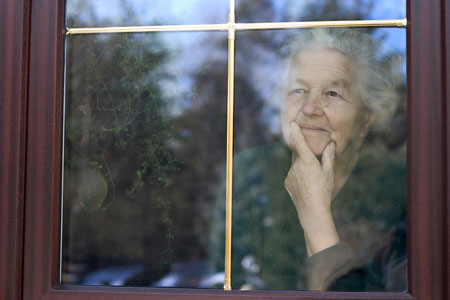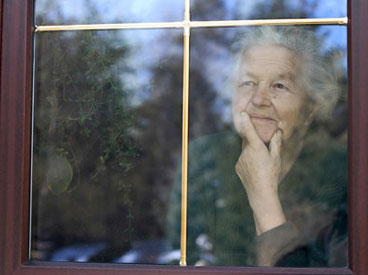Devra Lee Fishman’s dear friend and college roommate, Leslie, died from breast cancer one month shy of her 46th birthday after a four-year battle with the disease. Being with Leslie and her family at the end of her life inspired Devra to help care for others who are terminally ill. Each week, she documents her experiences volunteering at her local hospice in her blog, Hospice Girl Friday.
I completed 16 hours of training before I became a hospice volunteer six years ago. Part of that training focused on how to talk to patients and more importantly, how to listen. “Take your cues from the patients. Let them steer the conversation while you ride along. Ask open-ended questions and try not to fill any silences,” the trainer told us.

I like to be prepared before I ask patients any questions, so when the call bell for room 103 rang as I was settling into my shift, I checked the census before going to the room. Helen Landor. 84 years old. Ovarian cancer. Admitted the previous day.
As usual, I knocked as I walked in. “Good morning, Mrs. Landor. I’m Devra, the Friday morning volunteer.”
Mrs. Landor’s bed had been moved so she could face the wall of windows that overlooked the garden. The curtains were open, and the early morning sun was peeking through the young leaves on the honeysuckle trees outside. Mrs. Landor was sitting up with a small brown stuffed teddy bear tucked under her right arm.
I stood next to the bed and asked, “How can I help you today?”
“I’m done,” Mrs. Landor whispered.
I looked around for a breakfast tray or a soda can and saw nothing.
“Done?” I asked.
“Yes, I’m done. I don’t want to live any more. I’m done.”
“Oh, that done,” I said, realizing what she meant.
Before my training, I would have reacted by telling Mrs. Landor to hang in there, or I might have redirected the conversation to a more positive topic. When I first started volunteering I had to fight that impulse, but staying in the patient’s conversation was second nature to me now. Without hesitating I asked her, “Are you uncomfortable or in any pain?” After all, that is the hospice’s number one concern.
I never thought about it before, but I suppose it does take a certain amount of strength to live knowing that you have a terminal illness.
I paused for a moment, put my right hand on Mrs. Landor’s, and swept my other hand up toward the windows and said, “Well, there’s a gorgeous, bright blue sky. Not a cloud in sight. The blossoms are popping on the trees, and you’re comfortable here, right?”
Mrs. Landor nodded and I continued, looking directly into her eyes. “So if you are done, at least it’s a beautiful day for it.”
“Yes,” she said, turning back toward the windows and smiling. “It is.”
I faced the windows as well, still holding Mrs. Landor’s hand. Neither of us spoke. About a minute later a man walked into the room and introduced himself as Mrs. Landor’s son. “How’s the patient?” he asked as he sat down on the chair at the end of the bed.
I looked at Mrs. Landor, who was looking at me, and said, “She seems comfortable.” Then I backed up a couple of steps and perched myself on the loveseat against the wall, not ready to leave yet. I was perpendicular to the chair so the three of us made a triangle. Mrs. Landor’s son then told me about her journey to our hospice.
Two weeks ago his mother, who lives in New Hampshire, drove 30 miles into (and then back out of) town to get her hair done, as she did every Friday. The next day she drove to Boston with some relatives and had lunch, including two glasses of wine, at the Cheesecake Factory. The day after that they all drove to Rhode Island to see more relatives, and Mrs. Landor enjoyed a glass of red wine with her big Italian meal. Then they all drove down to Maryland to visit some cousins. His mother started feel ill so the cousins took her to a doctor. “The doctor sent her over to a hospital for tests that showed she had ovarian cancer that was perforating her intestines, and there’s nothing they can do about it so we checked her in here for the time being,” he said.
I glanced over at his mother to give her a chance to add to the conversation, but she was staring out the window at some far away point. Her son continued, “She’s lived a good life. Just three years ago she was riding a camel in Israel. She’s been to six different continents, most of the states, and she’s been living on her own for years in a house with a huge garden that she tends and loves. I don’t think she likes being stuck in this bed, do you Mom?” He leaned over, put his hand on Mrs. Landor’s left foot, and gave it a playful wiggle.
“No, I don’t,” she said closing her eyes. “I was just telling Devra that I’m done. I don’t want to live like this.”
Her son let go of her foot and clasped his hands in his lap. The three of us sat together in our own thoughts for several minutes. When her son’s cell phone rang he excused himself. I sat with Mrs. Landor until she nodded off, and then I went back to my desk. Before I left for the day I stopped in to say goodbye. Mrs. Landor was still sleeping.
When I came in the next Friday Mrs. Landor was gone. Her nurse told me that over the weekend Mrs. Landor had gone from “being done” to wanting to die at home, so her son took her back to New Hampshire. Mrs. Landor passed away peacefully the following week in her own bed. I understand she was facing out toward her beautiful garden.
Previous post: Lessons from Room 4 Next post: Just Being There
Become a Saturday Evening Post member and enjoy unlimited access. Subscribe now



